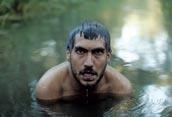Dir/scr: Emin Alper. Turkey-Greece. 2012. 94mins

An intriguing, slow-build family drama that morphs into a thriller before finally revealing itself to be an ethically-loaded western, Beyond the Hill is an impressive feature debut for Emin Alper, who in his spare time teaches history at Istanbul’s Technical University.
Beyond The Hill conceals rewarding depths beneath its placid surface.
The film uses a darkly wry tale of a rural family patriarch’s resentment of the nomads who graze their animals on his land to explore the mechanics of racism and society’s demonisation of The Other, and to stand, perhaps, as a parable of contemporary Turkey. But there’s nothing preachy about the story, which keeps us guessing throughout, and stands up on its own tensely dramatic terms as an original study of male group dynamics.
Beyond The Hill (Tepenin Ardi) is sure to see further festival action following its premiere in Berlin’s Forum sidebar, and could well score some theatrical action in territories where a low-budget Turkish film by a first-time director is not an impossible prospect.
The entire film is set in a rural Turkish valley with something of a Kebab Western feel about, with its poplar groves, eroded cave-pocked gorge walls and stony upper slopes. The only building visible for miles around, a simple but serviceable farmhouse, belongs to Mr Faik (Levent), a fierce old patriarch who has retired back to the family farm. The script is sparing with details, but we gradually work out that Faik is the father of Nusret (Ozcan), who is visiting from the city with his two sons, and who treats this rural break as a long picnic, to his father’s contempt.
Nusret’s elder son, Zafer (Hakman), is not quite right in the head, and it doesn’t take us long to work out that the soldiers he keeps seeing, and arranging to join on their missions, are all in his mind. The younger son, Caner (Kiran), is keen to use this country break to get his hands on grandpa’s rifle and become a shooting ace. The other members of the group are burly Mehmet (Ozgur), who helps Faik out around the farm, his wife Meryem (Fotocan), who cooks up a storm from inside the house, and their loner son Sulu (Gumus), who seems to resent the arrival of these outsiders.
At first we seem to have stumbled on a gentle generational drama based on Turkey’s city/country rift, but little currents of tension gradually begin to skew the tone towards something darker. Some will find the leisurely pace of the film’s thriller evolution too slow to take, but a faster march would disturb the atmosphere of uneasy, charged rural stillness which Alper so ably evokes. Manipulations of point of view and gaps in what the audience is allowed to view further rack up the suspense, as we wonder whether Sulu’s sheepdog companion was shot by Caner or, as Mr Faik maintains, by those pesky nomads. The nomads, though, are nowhere to be seen – they’re the invisible enemy, out there somewhere, beyond the hill. Perhaps they don’t even exist.
The camera sometimes takes a sardonic, imperious, immobile view of the whole odd business, and sometimes drops the omniscient mask to get involved, following along behind the characters and moving from group to group as if trying to puzzle out the story. Music is reduced to a single surprising quasi-comic burst right at the end, which dispels the tension and makes us rethink what we’ve just been watching. But thinking back and thinking over is one of the joys of this little gem of a film, which conceals rewarding depths beneath its placid surface.
Production company: Bulut Film, Two Thirtyfive
International sales: contact Bulut Film, www.bulutfilm.com
Producers: Enis Kostepen, Seyfi Teoman, Emin Alper
Cinematography: George Chiper-Lillemark
Editor: Ozcan Vardar
Production designer: Ismail Durmaz
Music: Inanc Saver, Volkan Akmehmet
Main cast: Tamer Levent, Reha Ozcan, Mehmet Ozgur, Berk Hakman, Furkan Berk Kiran, Banu Fotocan, Sercan Gumus, Sevval Kus




















